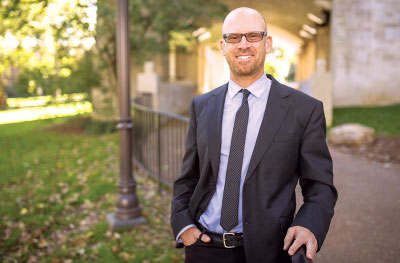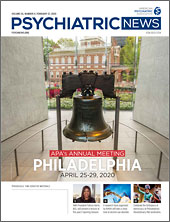Maybe gun violence, including a mass shooting, is a simple thing: guy (or woman) with a gun pulls the trigger. Bang. Or maybe it is the violent intersection of any number of social and political influences: gun laws or the lack of them, socioeconomic status, racial and gender stereotypes, social networks (or their lack), and feelings of community connectedness.
Jonathan Metzl, M.D., Ph.D., this year’s Benjamin Rush Award winner, will seek to untangle these social determinants of gun violence and how psychiatrists might usefully address them in the lecture “Mental Illness, Mass Shootings, and the Politics of American Firearms.”
He is the Frederick B. Rentschler II Professor of Sociology and Psychiatry and the director of the Center for Medicine, Health, and Society at Vanderbilt University. The Benjamin Rush Award, established in 1967, recognizes an individual renowned for major contributions to the literature on the history of psychiatry.
Metzl is the author of the recently published book Dying of Whiteness: How the Politics of Racial Resentment Is Killing America’s Heartland. In the book, Metzl examines how racial and class anxieties and resentments among white working-class Americans are connected to public policies—repeal of gun control laws and curtailments of school, health, and social support programs, including the Affordable Care Act—that have measurably hurt working-class Americans.
It’s Metzl’s fourth book. In 2010 he published The Protest Psychosis: How Schizophrenia Became a Black Disease in which he examined how schizophrenia and race became intertwined and African American men came to be overdiagnosed with the disorder.
Metzl’s 2003 book, Prozac on the Couch, traces the notion of “pills for everyday worries” from the 1950s to the early 21st century through psychiatric and medical journals, popular magazine articles, pharmaceutical advertisements, and popular autobiographical “Prozac narratives.”
His recent work has focused on guns and gun violence, including mass violence, and the ways in which gun violence is falsely conflated with mental illness. In a 2015 article in the American Journal of Public Health, Metzl and co-author Kenneth MacLeish, Ph.D., wrote: “[N]otions of mental illness that emerge in relation to mass shootings frequently reflect larger cultural stereotypes and anxieties about matters such as race/ethnicity, social class, and politics. These issues become obscured when mass shootings come to stand in for all gun crime and when ‘mentally ill’ ceases to be a medical designation and becomes a sign of violent threat.”
In comments to Psychiatric News, Metzl said his lecture will address how psychiatrists can meaningfully contribute to discussion and debate about guns. “A host of false assumptions surrounds the narrative that tries to connect mental illness with mass shootings,” he said. “You have to look at mass shootings in the context of gun laws, social networks or the lack of them, gender stereotypes, substance abuse, what guns symbolize for people—all of the other stories that get put on the back burner in the rush to focus on mental illness. These are the kinds of issues psychiatrists can address more meaningfully than trying to make individual-level predictions about who will be violent.” ■
The lecture “Mental Illness, Mass Shootings, and the Politics of American Firearms” will be held Tuesday, April 28, from 10 a.m. to 11:30 a.m.
The American Journal of Public Health article is posted
here. “What Guns Mean: The Symbolic Lives of Firearms” is posted
here.

